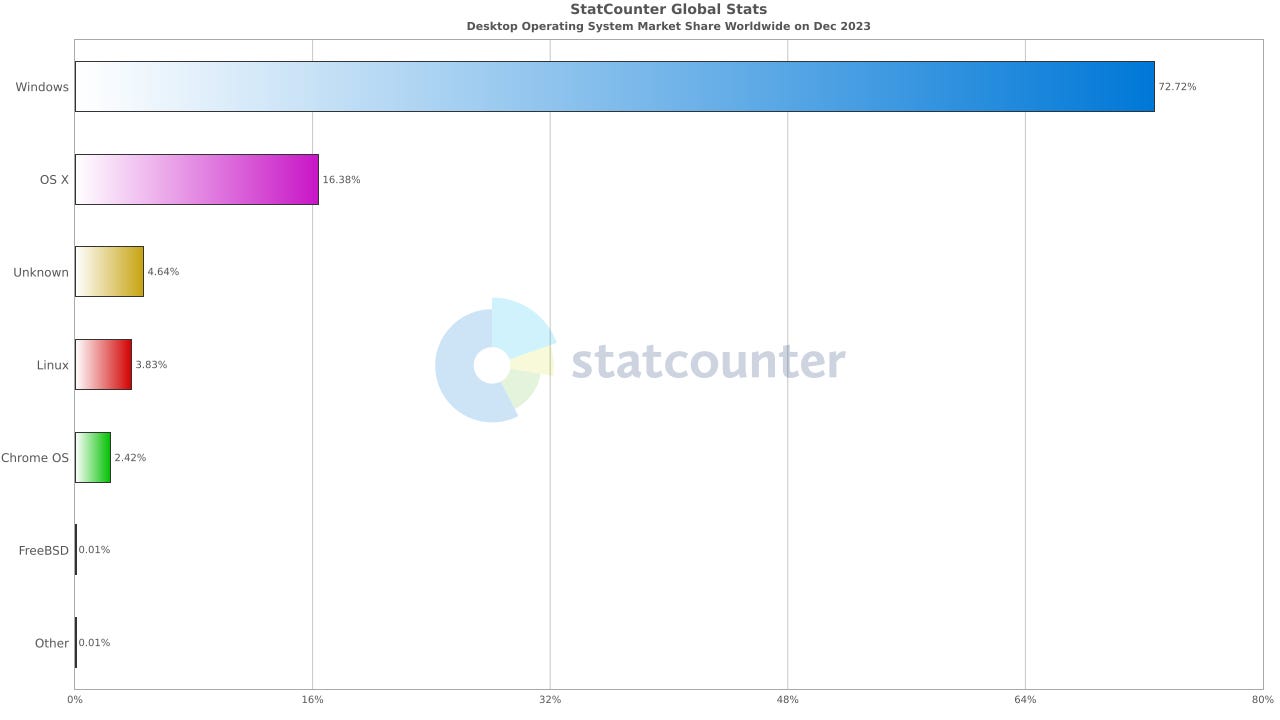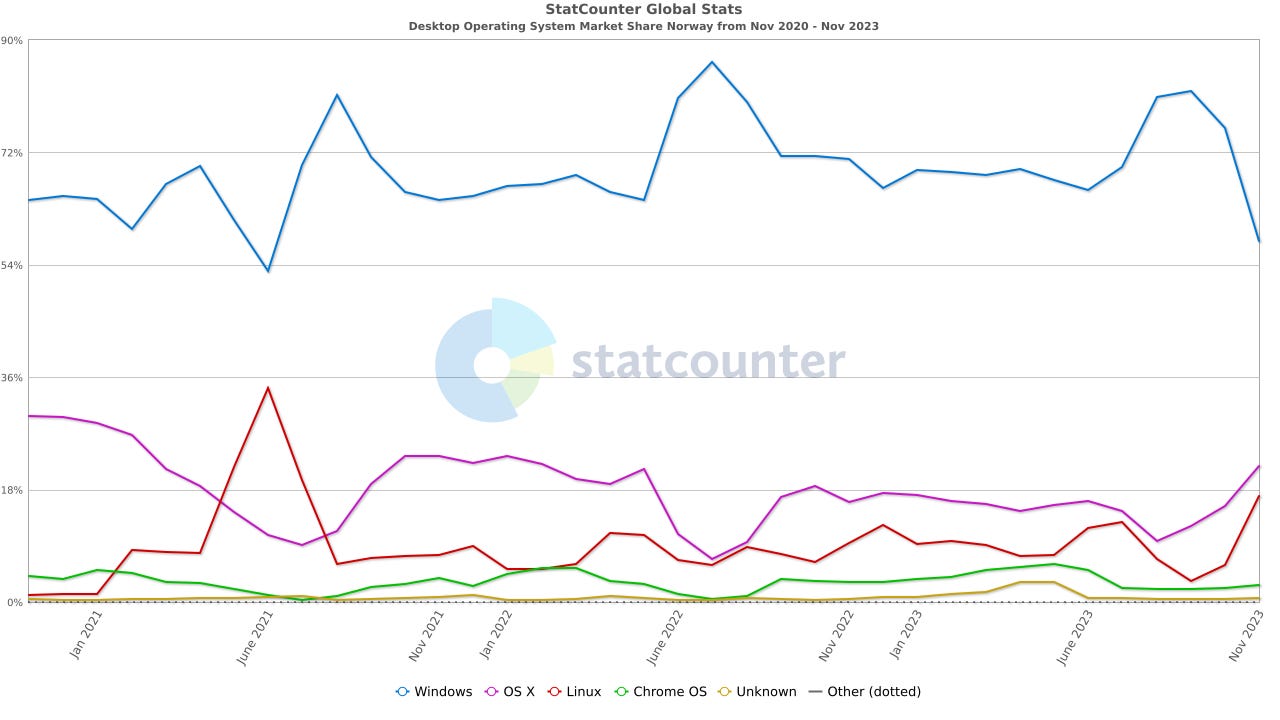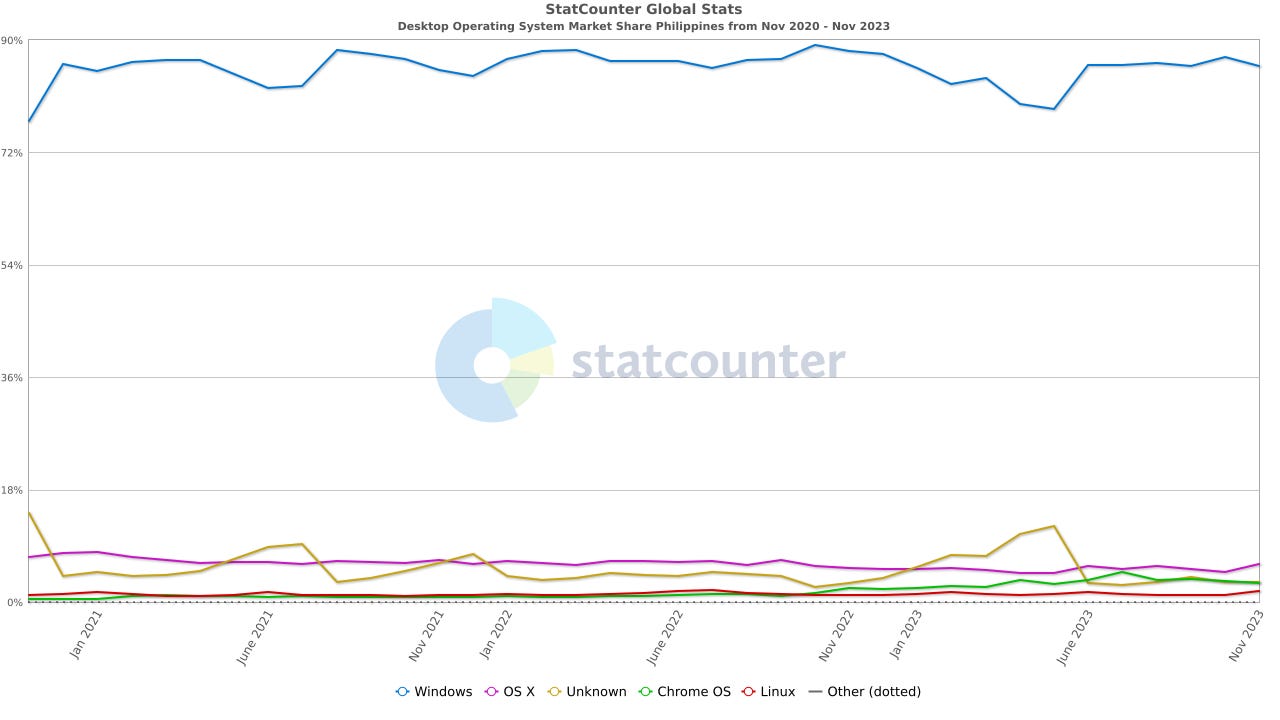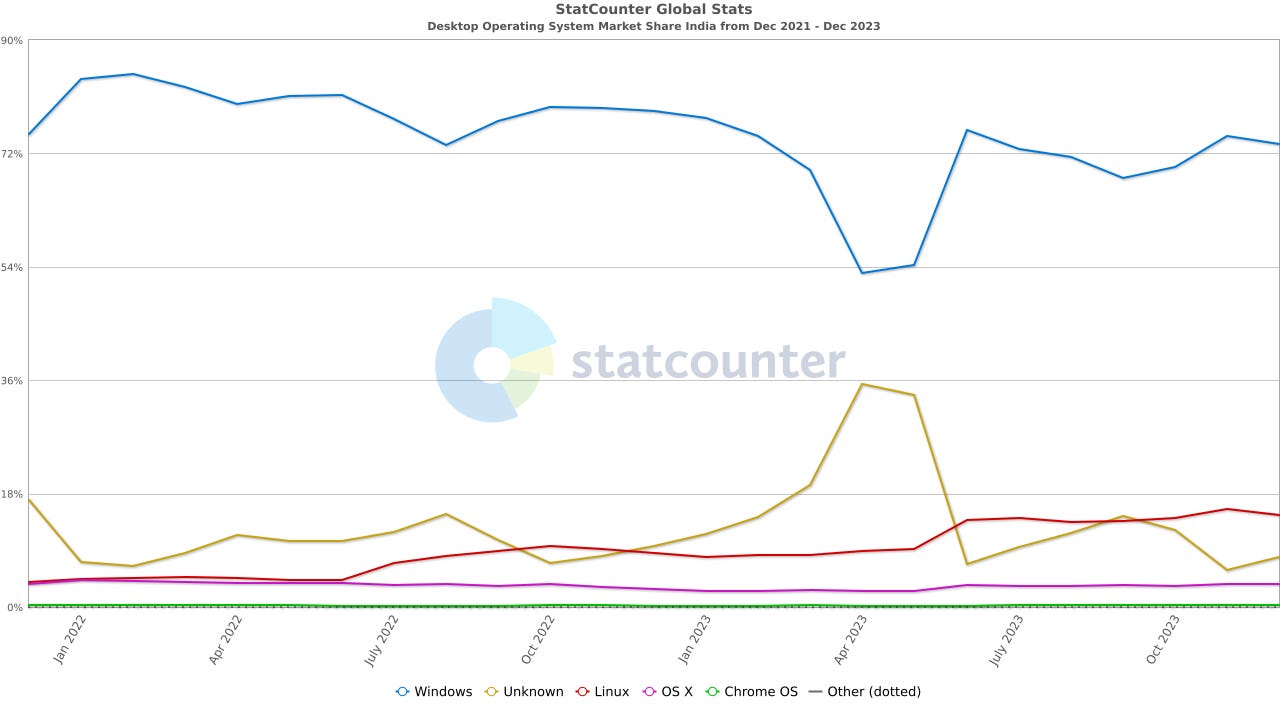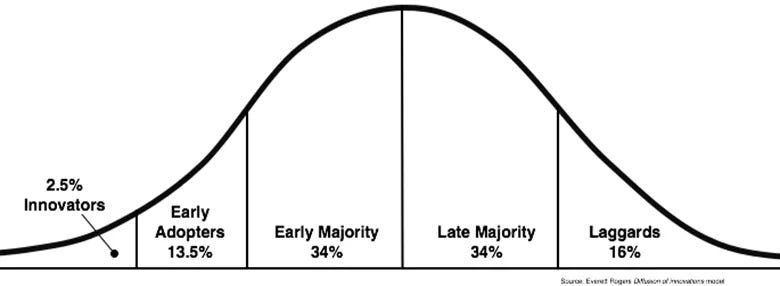Linux is the future
Opinion
22nd January 2024
Linux statistics
Global Statistics
It is also the present. On the server side, Linux dominates the market:
In 2022, 100% of the world’s top 500 supercomputers run on Linux.
All of the top 25 websites in the world are using Linux.
96.3% of the world’s top one million servers run on Linux.
90% of all cloud infrastructure operates on Linux.
Source: https://webtribunal.net/blog/linux-statistics/
On the desktop side however, only around 3% globally are running Linux today.
However, the trend last year has seen a significant increase from 2.09% since December 2021:
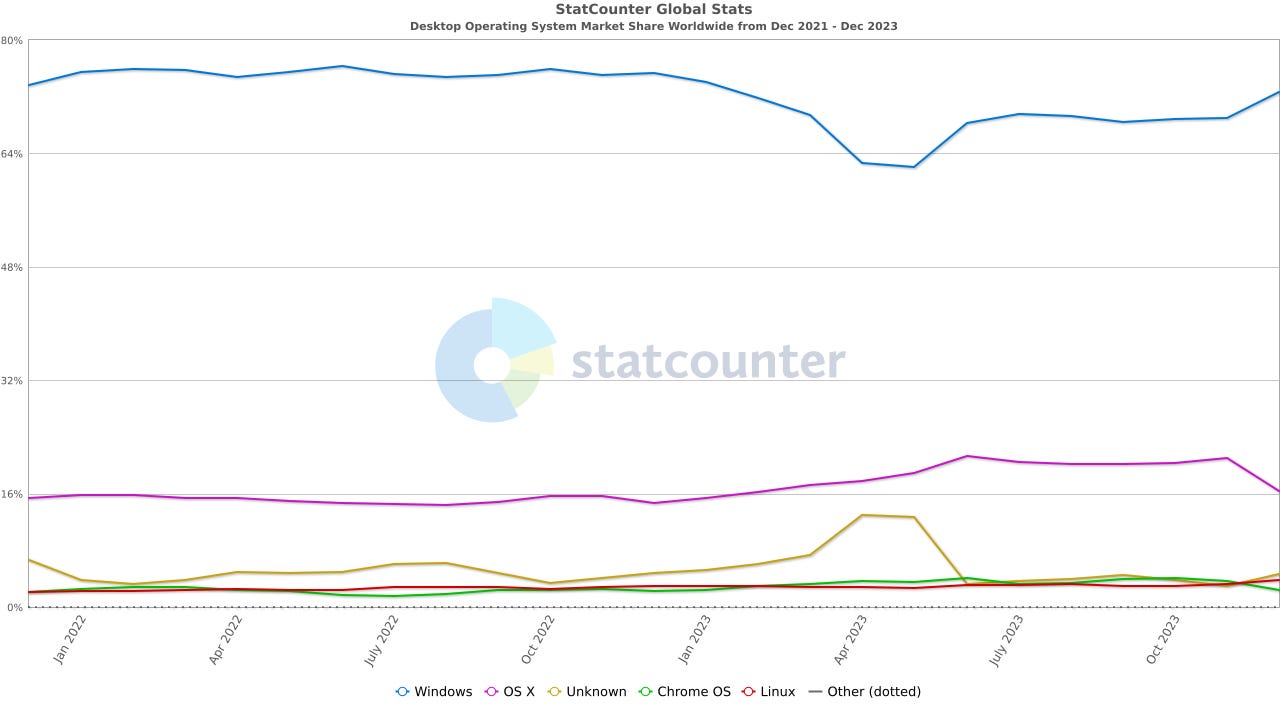
As i wrote in my last blog about coming legislation’s that will severely diminish our privacy, I can only see this trend increase the coming years.
National Statistics
Norway
In Norway, something interesting is going on. It appears to have many increases and decreases the last years. It makes me wonder if this chart is accurate.
At least it appears like Norway is high above the global average, but where are the users? As an eye witness, Microsoft seems to dominate most big businesses and only Apple seems to be challenging. Maybe the small businesses and home computers are migrating to Linux?
Phillippines
I have just been on a vacation in The Phillippines and was curious about the Linux statistics there. My theory was that it would be more popular due to it’s low cost and backwards compatibility, considering Philippines is a developing country. My theory was however completely wrong; it is below the global average:
It could be because to the lack of education in open source software. Microsoft have in the past invested in cheap education and products in third world countries. A brilliant move, but things can change if the Filipinos finds out about the benefits of Linux.
India
India are the home for many IT people. Many open source blogs I read seems to be written by Indians. Not so surprisingly the graph shows India way over the global average, around 15%. The interesting thing is that only 2 years ago, it was only around 5%.
Finland
The home country of Linus Thorvald, creator of the Linux Kernel 1.0. They should definitely be above the global average right? Disappointingly, it’s currently only around the global average.
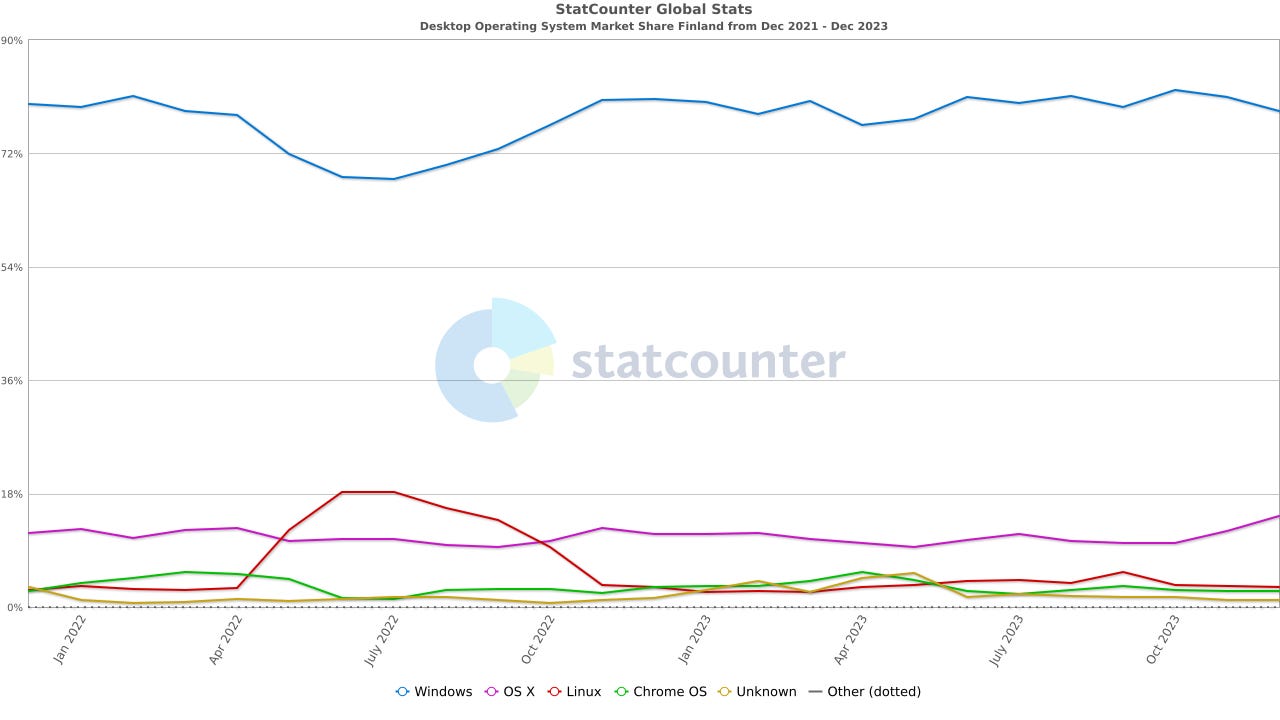
OK, enough statistics. This was just a sample of the trends worldwide.
Why you too should switch to Linux
Top reasons to join the trend
Increased Security and Privacy
This is the top reason to switch. The more sophisticated Apple and Windows becomes to track you, the more reason to switch to a system that respects your privacy. Microsoft and Apple might claim they care about your privacy, but why do they need to collect so Linux is also more secure than Windows. The benefit of having open source code is that others will be able to find vulnerable code and fix it much quicker than if it was proprietary. Also, I sometimes wonder if the back doors are intentional. That practice won’t be accepted in the open source community. If Linux is good enough for US Department of Defense, it is certainly good enough for you.
Cost effective and complete ownership
Under the GPL License, Linux is completely free; free as in most distributions doesn’t cost anything, and also free as in freedom. With Linux:
Free to use;
Free to change the code;
Free to share with anyone;
Complete transparency of the source code;
Immune to government interventions (There is no legal entity that can be targeted).
The only consideration is that Free Open Sourced Software comes with no warranties. Usually developers have a paid version of their software which comes with support, but in many cases an Internet search is enough to find out what you want to know.
With Microsoft Windows:
Licensed usage, which means you don’t really own it.
Pay to use;
Not allowed to change;
Not allowed to share;
Code is hidden from public;
A target for government interventions.
The only benefit with Windows is that they have to guarantee their software is working properly. However, I have been using Kubuntu Linux everyday for more than a year now and I have never had any major trouble that I couldn’t fix with the help of the open source community.
Lighter Software, better performance
Linux requires less hardware consumption than Windows. If you have an old and slow computer at home, try to install Linux on it and I’ll bet it will perform much better (You might need to upgrade your harddisk if you have one of those old spinning HDD’s. That will also increase performance significantly).
Stable and easy to use
Yes, really. At one point in time Linux might have only been for geeks with special interests, but that is certainly not the case anymore. It’s easy to install both OS and appliactions, runs smoothly and seldom any issues, especially on older computers. Also, the more people that migrates over to Linux, the better it will become.
Even gaming is not an issue anymore. The most popular games on Steam can be run on Linux already.
Note: With that being said; there might be some driver problems on newer laptops. New Computers with AMD Ryzen CPUs and graphic cards are recommended. You might want to do some research before reinstalling a brand new computer with Linux. If you are looking for a new laptop, I would suggest you buy a laptop with Linux pre-installed.
Be an Early Adopter
Right now the Linux adoption rate is about to take off. Remember how fast it went for India from 5% to 15%. If you want to be ahead of your peers, the time is now. We are on the breaking point of innovators and going in to the Early Adopters phase according to Moore’s Idea Diffusion Curve.
How to learn Linux
Are you feeling like you want to do the switch but are not completely confident yet? I know from people that have tried before but just don’t have the patience to learn yet another operating system, so they go back to their old habits. They are more interested in other things than computers. I’m doing my best to share knowledge here on my blog. This year I’m going to focus more on Linux basics until I have a complete course for everyday use.
I have a feeling that it will become much easier to adopt Linux from now on. Basic Linux courses starts to pop up, knowledge sharing increases and software and hardware will improve to a point where it can out-compete both Apple and Windows in the coming years.



